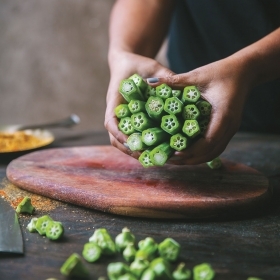Photo by Richard Howard
A few years ago, in those once and future times when we could gather on campus for joyful, raucous reunion parades, I drove a golf cart through the phalanx of alums lining both sides of College Road. My passenger and I—both part of the Alumnae Association board of directors—were at the head of the parade with the board, leading the antique cars. Progress was a little slow as the group stopped to cheer each class, and as a result, the most extraordinary thing happened. All along the way, alums festooned in purple, red, yellow, or green broke out of their lines and ran over for a hug or to chat for a few minutes. Alums who had appeared in the magazine whom I had gotten to know via email. People who had been key volunteers for the WCAA. Folks I had met at large Wellesley events, or women I had known as students. It was like driving through an enormous outpouring of affection, and it made me realize why our most senior alums just revel in leading the parade in the jaunty old cars. By the time we reached Alumnae Hall, I was thinking, “This is what it means to put down roots in a community and stay there for a long time.”
I’ve had the same feeling in the last few weeks, since I announced that I was stepping down as editor and leaving the College to work in the museum world, a longtime interest of mine. There have been emails, cards, and calls from all over the globe with a deluge of affection and gratitude for what the magazine has been over the decades. All of this has left me feeling quite blessed for 24 years in such a supportive worldwide community.
Some of the blessings I’m most grateful for:
- Daily contact with Wellesley students, most particularly the “MagKids,” as we call the students who are so critical to magazine operations. Beyond the invaluable editorial assistance they provide, they have stretched us, made us laugh, and taught us things we never could have imagined. About what happens when a shy student goes abroad for junior year, travels around and jumps out of a plane for fun, and comes home wholly transformed and not shy. About what it means to grow up as a new immigrant or a devout Muslim in a time of anti-immigrant or anti-Islamic sentiment, and how the rest of us can be better allies. About the joy of discovering you have a passion for book arts or politics or creative writing—and the joy (on our parts) of watching that newfound enthusiasm.
- The chance to rub shoulders with our most “experienced” alums. Like the ones in their eighth or ninth decades who continue to live “Non ministrari”—for example, the ’50s alum who told me recently that she was going out to “visit the elderly.” Or the Wellesley woman who jumped out of a plane for her 90th birthday. (Is this now a Wellesley thing?) All of us face different circumstances in our lives, but I’ve continued to feel enriched by the grace, courage, and sheer engagement with the world that I’ve witnessed in our eldest ranks. I want to be like you when I grow up.
- Watching and experiencing the generosity of this community. The alums on the West Coast who dropped everything to visit a Wellesley woman they didn’t know—so she wouldn’t feel so alone in a nursing home. The professors who give untold hours to their students and are still willing to don hip waders and stand in Lake Waban for an hour while we photograph them for an article (just for the record, we have photographed at least two professors in close proximity with Waban waters over the years). The seasoned alumnae journalists who issue after issue have reported and written stories for us, even when they’ve been stretched thin by the many news deadlines in their professional lives.
- Having so many years to witness how all of you, across the generations, live your lives. People have often asked me where we get our story ideas. The answer is very simple—by watching what you do. Yes, we’ve featured some of Wellesley’s most prominent alumnae, whether running for public office, writing bestselling books, or leading groundbreaking scientific research. But we’ve also taken you into the pandemic classrooms of alumnae teachers, talked about the difficulty of balancing career and family, and even looked at what happens when we don’t live up to our very high aspirations. The College’s mission statement that Wellesley women are being educated “to make a difference in the world” shouldn’t seem like a rebuke; nor should it keep you from sending news to the magazine. You can make a difference in any number of worlds—by rescuing a stray dog, volunteering at a homeless shelter, or being secretary of state. So be sure to tell the magazine and your fellow alumnae about it.
In all the very touching notes and emails of the last few weeks, a number of you have paid this Mount Holyoke alum what I consider the supreme compliment: “You may be leaving, but you’re one of us.” Thank you. That means a great deal. If that is indeed the case, I’ll plan to turn up for future parades, wearing a little bit of purple, red, yellow, and green over my whites (because where else am I going to wear all these white outfits that I own after 24 years?). I hope you’ll continue to come over for a hug or a chat to update me on your lives.
Alice Hummer stepped down as editor of Wellesley magazine on April 2. She is shown above in the 2018 reunion parade with Desiree Urquhart CE/DS ’99, then a WCAA board member (at left). With Alice’s departure, Lisa Scanlon Mogolov ’99 became interim editor.







